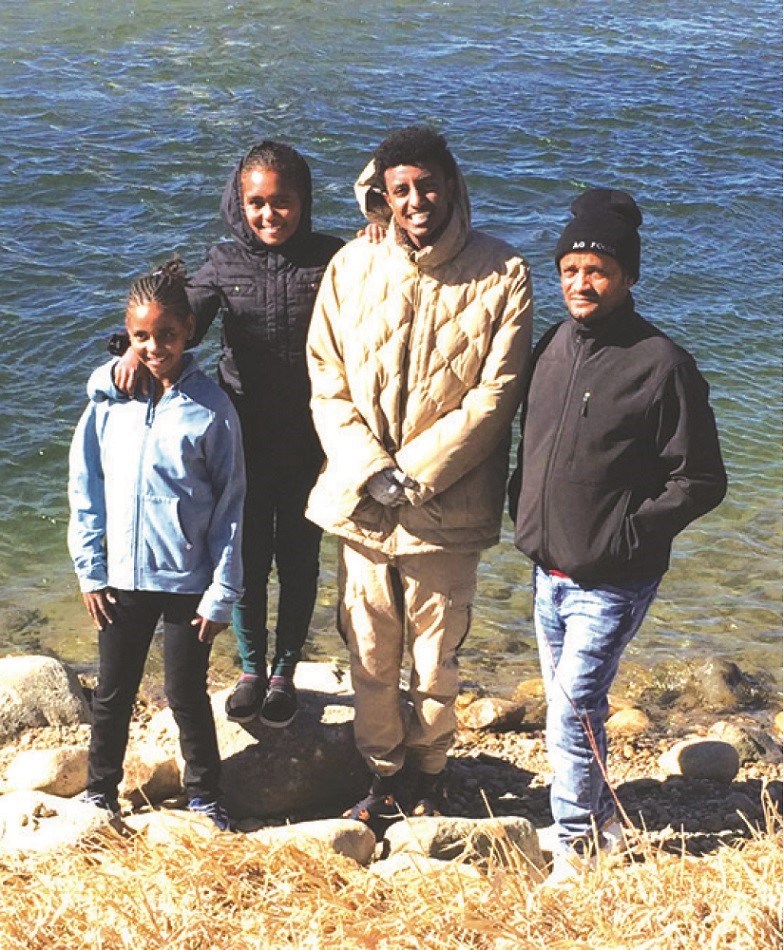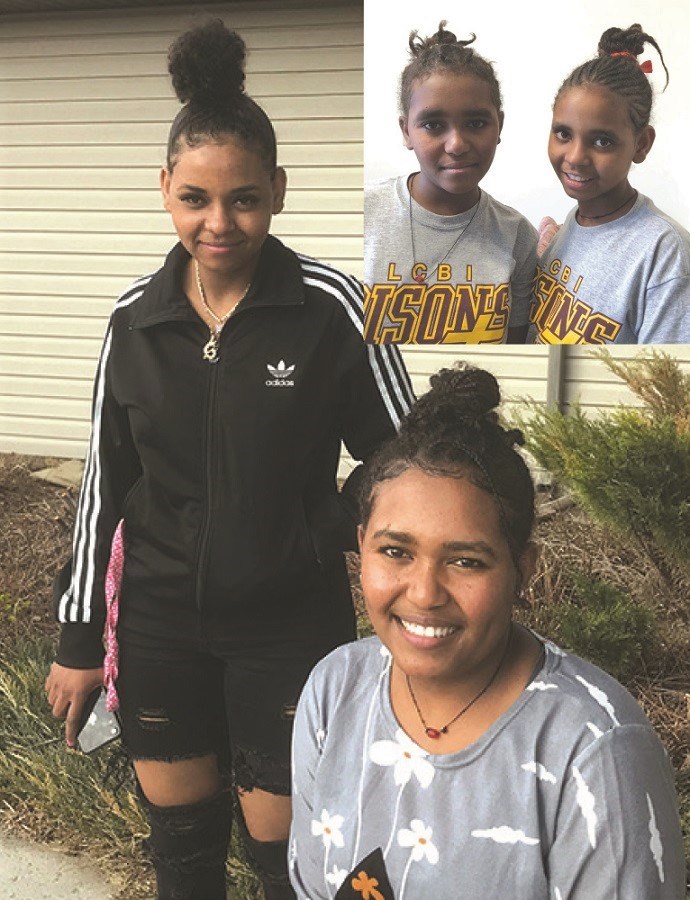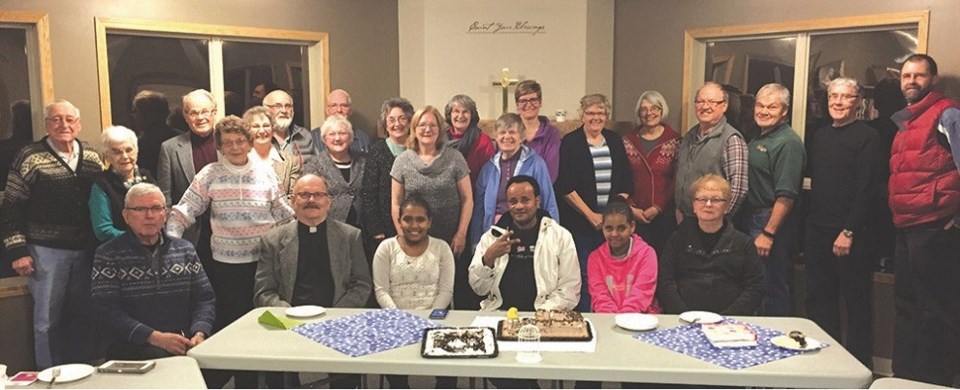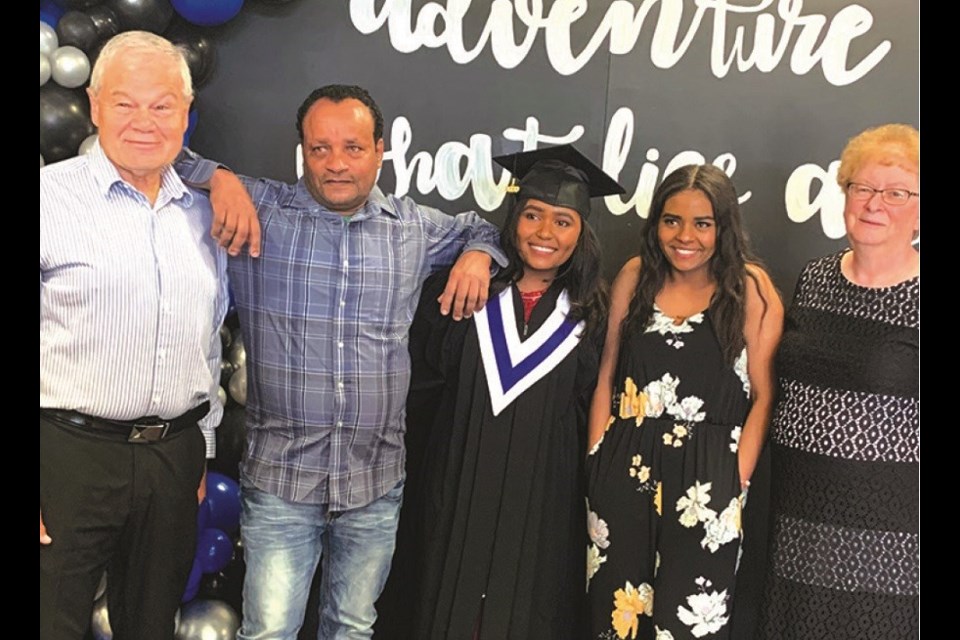They were one family amongst thousands escaping violence, famine and persecution in search of shelter and safety, often in refugee camps. But they are more than statistics in United Nations reports. They are people with hopes for themselves and dreams for their children. That is certainly demonstrated in the story of Asmeret and Selam, two young women reflecting on the five years since their family left a refugee camp in Ethiopia for a new home on the prairies of Saskatchewan.
Measho Tsehaye Reta, husband and father, was living in Eritrea, a country in Eastern Africa whose government had one of the worst human rights records in the world according to Human Rights Watch. Measho, his wife and son left for Sudan where daughters Asmeret and Selam were born. A few years later, and in search of safety, Measho and the children left for a refugee camp in Ethiopia.

The country of Ethiopia has a long history of hosting refugees. Measho did his research and learned a lot about its two dozen camps. He was willing to wait to get into a particular one he felt provided the best chance at coming to Canada.
At the tender ages of 5 and 7, Selam and Asmeret began life in a refugee camp. The family lived in a tent, sleeping on an embankment of dirt their dad built up. Selam slept in the middle and often said the one in the middle had no place to turn!
They received food and clothing from international agencies, and retrieved their own water when it was available. “We had to walk to get water and sometimes the water doesn’t come and you’d have to wait, two days or three days for it,” Asmeret shared. “When it came we would fill every container in the house so we’d have enough.”
The girls attended school a one hour walk from the camp. They carried all of their books back and forth each day, but no lunch since there wasn’t one to take. “We just ate in the mornings at home and then we would come back and eat supper in the evening,” Selam explained.
Classes were taught in three languages; English, Amharic and Tigrinya so the girls studied in Tigrinya, their first language. Asmeret smiled as she reflected, “We didn’t know how important English was. When we came here it would have been helpful.”
They had friends their age to hang out with but made sure to get home in the daylight because it wasn’t always safe in the camp. Selam explained, “We couldn’t go too far. You would never want to be late. You got home before it got dark.”
The girls’ parents had separated, so their mom was no longer living with them. She remained in the area and the girls said their happiest times were the rare occasions when they had a chance to see her.
After living in the camp more than seven years, Measho received news that his family had the opportunity to come to Canada. “At first we were scared,” Asmeret said. “We were leaving our mom to come here and we had nothing and knew nothing about this area.”

They didn’t know it yet, but 12,000 kilometers away a committee was organizing paperwork, furnishing a house, and preparing for the arrival of a family they couldn’t wait to welcome. Bethlehem Lutheran Church in Outlook had worked for several months to become a sponsoring organization in bringing a refugee family to Outlook. The United Nations High Commissioner for Refugees identified those who were eligible for refugee status and once the congregation at Bethlehem made the decision to proceed, discussions with Canadian Lutheran World Relief sought the best possible fit for Outlook. Just weeks later, a profile on the page was to become a family warmly embraced.
In March 2016 a large welcoming party gathered at the Saskatoon Airport to greet the family. The girls were so tired they don’t remember much. “I didn’t even know there were that many there to meet us,” Asmeret said. “I saw a picture later and thought ‘all those people were there?’ I was so tired I didn’t even know.”
After a couple days of rest, they started to get familiar with their new town and the people who had a hand in preparing for their arrival. That included women who organized all the donated clothes so the family could select items they wanted. It was in these early days, that the girls’ personalities were already emerging.
In the camp, the girls would be handed clothing to wear. The opportunity to give them choice here, was important. It was clear how much that meant to them according to a story shared by Bea Adelman, a committee member who now considers the girls family.
There was a sweater Selam tried on that everyone thought looked so nice on her, but Selam wasn’t convinced. The women really thought she should have it so they put it back in her pile to take home. But Selam saw it and once again put it back on the rack. Bea smiled and said, “She did not want that sweater. We knew she was strong willed and would stand up for what she thought was important.”
Daily English classes took place at the church, taught by a team of volunteers, and then after Easter the girls were enrolled in school. It was at that point the challenges of language became very evident. On the first day of school Asmeret was shown a locker and told she could put her belongings in it, but she didn’t understand and carried them around all day. Bea said, “The biggest shock for me was when we realized they didn’t really understand anything we said at the beginning. Things we took for granted that we thought they knew, but didn’t.”
Asmeret was outgoing from the start and this served her well. One day after school she saw students playing with a ball and thought it looked fun so she approached a teacher and asked if she could play. “Somehow she understood me,” Asmeret said with a laugh. “She talked to the coach and said I could join.” She took part in volleyball, basketball, track and field, and badminton and believes it helped develop her language skills. “I learned what words like ‘pass the ball’ or ‘go get the ball’ meant. When we went with the group to travel to games I learned from listening to the girls talk.”
Other big adjustments were climate and food. They recall arriving at the airport and С����Ƶ offered jackets. Their older brother, who now lives in Alberta, declined the offer until they got outside. When he experienced the March temperatures the girls say he quickly changed his mind.
There was no snow when they arrived but a few days later there was enough to play in. Cliff Adelman took them outside and taught them how to make snowballs. Asmeret accidently hit him quite hard with one and felt so bad. Cliff, a longtime coach enthused, “That girl has an arm!”
In the refugee camp people eat what is supplied by relief agencies. “It was mostly rice,” Asmeret said, “which is why I don’t like it today.” There was a communal kitchen in the camp where Measho cooked rice, pasta and sometimes bread. Today, Selam’s favorite foods are pizza, cheeseburgers and spaghetti and answered, “oh yes, so much” when asked if she adjusted to food easily here. Although their dad works for a potato company they aren’t huge fans of spuds, except in the form of French fries.
The refugee sponsorship agreement required that Bethlehem Lutheran cover six months of expenses for the family with the federal government covering an additional six months. At the end of one year the family was expected to meet their own expenses. Through hard work and perseverance Measho achieved that financial independence. Darlene Hovdestad, committee member said, “I am amazed with Measho, that he managed to keep them all safe in the camp, that he organized all this to get them over here, the way he has taken care of them, and the way he’s been able to support them. It’s just amazing.”
It hasn’t been easy but Measho has always put the needs of the girls first. Bea said, “He’s had opportunities to go other places but he feels the girls are safe here and that’s very important to him. He’s made sacrifices so they could stay here and be safe.”
The absence of their mom concerned the women at Bethlehem so a group of them have tried to fill some of those roles, from helping with homework to grad dress shopping. “They did everything that moms do,” Asmeret shared. “They were so good.”
Family and friends back in Ethiopia are never far from the girls’ minds, particularly as people are suffering tremendously due to civil war and severe food shortages. It’s more than Asmeret can bear at times. “You just never know what will happen to them,” she said. “People are running for their lives. There’s a lot of children who don’t have parents and they have no place to live. Day and night it is just getting worse so you just worry.”

Very little contact with family makes the situation feel even worse. After trying for several months, the girls were finally able to talk to their mom, just two weeks ago. “I was so happy that day,” Asmeret said. Their mother has health problems and it caused worry for the girls when they weren’t hearing from her. But getting to a phone is a long walk and requires paying people for access. “There is a line up so you only get a few minutes,” Asmeret explained. “You have to talk fast because a lot of people are waiting. But finally I talked to her and she said ‘I am okay.’”
The family is doing what they can to help. Asmeret graduated in 2020 and is working right now. Although she’d like to save up to buy a car, instead both she and her dad are sending money to loved ones struggling through the crisis. “I send money to family to support them because they have nothing. It doesn’t help a lot but it can help buy food which is the most important thing right now. I’m working so it’s good that I can help.”
It makes the girls appreciate their life here. “I am happy to be here,” Selam stated. She is in grade 11, has a love of make-up and fashion, and enjoys hanging out with friends. Although she is quieter than her sister, they agree her English is far better. The family speaks English in their home and Selam will often be the one to correct errors.
Asmeret has applied to a postsecondary program and is waiting to hear her status. “I would like to become a recreational therapist because I like helping people. That’s my dream.”
The financial sponsorship agreement to bring them here has long ended, but not the care and support. “We feel like we have family here,” Asmeret said. “When we first came I didn’t know we would get this help and support. I thought we would be on our own. But even after five years living here we have people helping us. It’s really good. Everything is good.”
It has been a great experience for the church, too. Bea remarked, “I just think we were very blessed with the family that we got. I am amazed at what these girls have accomplished and what they continue to do. The blessings go both ways.”




